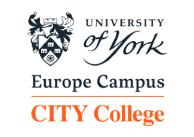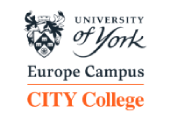The English Studies Department Examines the Nature and Significance of Online Teaching
“It is the supreme art of the teacher to awaken joy in creative expression and knowledge”
Albert Einstein

On Tuesday, 12th December 2020 the English Studies Department considered and exchanged ideas and information on a highly relevant topic accompanied by the mentality of Einstein’s quote above. Dr Vicky Papachristou delivered a seminar titled: “Online Teaching: When, Why, What and How” thus touching upon crucial concerns within the field of teaching and learning particularly given the current circumstances and the impact of Covid-19. Despite the challenges and difficulties, the overall mood was uplifted by the desire to bring interested parties together – both teachers and students – to share ideas, express concerns, and gain insights to the new developments in teaching and learning.
Dr Papachristou primarily begins by providing definitions of distance education, noting that it actually began three centuries ago and first appeared in Greece in 1992. She then proceeds to demonstrate when online teaching is required such as in cases of long distances, professional development, work obligations or even a pandemic. She then indicates why it may be important and/or necessary to teach online and focuses our attention on the advantages and obstacles for both students and teachers. According to Dr Papachristou, generally anything can be taught, even in an online mode. The main question that should concern us is HOW.
Initial aspects pertaining to how we teach involved the hardware and software equipment we have at our disposal. The next aspect to consider in relation to its advantages but also challenges is that of synchronous (live) or asynchronous teaching. Each one displaying pros and cons, Dr Papachristou informs that many studies have been and are still being conducted on such aspects of teaching and learning as more and more people are switching to an online teaching environment. Tools for both cases are provided with Dr Papachristou expanding the suggestions to applications (e.g., Kahoot, Quizlet, PlayPosit, Edpuzzle, etc.), whiteboards, digital platforms (e.g., zoom, WebEx, google meet, skype, etc.) whilst not overlooking the contributions of emails, blogs, social media as well as video and audio recordings.
Certain parameters are taken into consideration regarding not just the implementation of online teaching but also the findings of studies focusing on different education levels in connection with online teaching. The data and the purpose of the research present positive attitudes in some cases towards online teaching, reveal challenges and obstacles that need to be tackled whilst also revealing figures that confirm that not everyone has the technological availability, accessibility, digital literacy, knowledge, and skills to handle, manage and navigate online teaching/learning situations, thus rendering seminars like this one even more relevant, helpful, and necessary.
As Dr Papachristou further demonstrates, we additionally need to consider the local context in which we are operating alongside what is happening on a global level. We need to be aware of what limitations, shortcomings and local obstacles need to be overcome to adopt strategies and models that appear to be working effectively in other countries and contexts.
Dr Papachristou also provides practical tips and strategies on how to handle various aspects of teaching and learning, ranging from but not limited to the digital platform, the syllabus, student grouping, interaction and engagement, authentic learning, methods of evaluation and assessment and shares some helpful, fun, and engaging ways to treat and tweak material to accommodate learners’ needs even online. Such examples include using photographs in combination with writing and/or speaking, using Twitter and tweets in connection with different subject matter, like history, and even utilizing podcasts and video sharing.
The current circumstances and the respective challenges are undoubtably great, we are all subject to varying degrees of change but if we want to succeed and see each other through these difficulties, Dr Papachristou advises that we keep the following in mind: “We teach in a remarkable time. Each day you walk into your school, whether it be a classroom, office, or somewhere else, remember that you help to shape the future and what you do can change the world!” (Adam Bellow, Educator)








